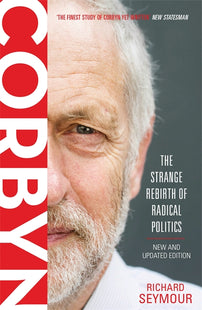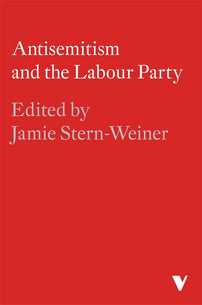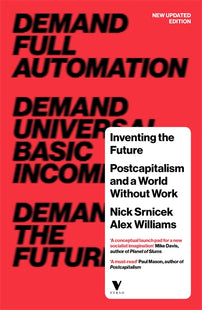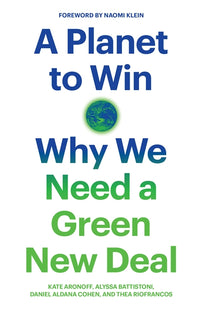"Legitimate Concerns"
Following Labour's defeat in last week's general election, and the collapse of the vote in the North and Midlands, there has been a revival of Blue Labour and debate about the white working class and the need for Labour to regain their votes. Eleanor Penny argues that the only viable option for Labour is a vision real economic offer of revival, combined with a true story of where power lies, not a pandering to bigotry and xenophobia.

The still-smouldering wreck of Corbynism’s first hopes is crawling with politicians scrapping for salvage material to rebuild their own careers. Stuart Hall wrote that “every crisis is a moment of reconstruction”. And as shocked and despairing Labour voters and activists search for a useful diagnosis of what the hell just happened, some politicians leap on an opportune crisis to reconstruct a schlerotic politics formerly somewhat sidelined by the prominence of the Labour Left.
The red wall crumbled. Seats once so safe you could by popular wisdom ‘pin a red rosette on a donkey’ and get it elected with a stonking majority have returned a triumphant cadre of new blue representatives. These are the ‘heartlands’ stretching from West Bromich up to Hadrian’s wall, ground zero for post-industrial collapse, ravaged by thatcher and shepherded through further decline since the Blair years, where incumbent Labour councils are seen as the witless, uncaring establishment. The institutions which ingrained working class support - unions, local papers, social clubs - have withered with the older industrial base now displaced in favour of fulfilment warehouses, zero-hours contracts and an atomised workforce. Where the powerful good intentions of the new socialist movement failed to put down roots in smaller towns and cities, a six-week door-knocking campaign was not enough to re-ignite enthusiasm for a Labour government. Votes were lost to the Brexit Party, to the Conservatives, but most of all to disillusionment.
This is one small fragment of a larger story of loss. More votes again went to remain-backing parties, costing Labour marginal seats like Stroud and Kensington. Messaging was a problem, confidence was a problem, leadership was a problem, the media blackballing campaign was a problem. But the story of the northern loss - flattened, unanalysed - has proved particularly compelling fodder for those stolid Corbyn-skeptics wanting to prove that they were right all along.
In some wood-panelled attic in SW1, someone has drawn a union jack on the floor in chalk and sacrificed a chicken, and Blue Labour has awoken from its slumber.
Established in 2010 and helmed by Labour peer Maurice Glasman, Blue Labour is a country club-come-lobbying group determined to drag the party away from apparently indulgent distractions of racial and gender justice, and towards foundational Vichy-like values of ‘family, flag and faith’. As the country reeled from the gut-punch of the exit polls, they lost no time in calling for a return to ‘social conservatism’ to accompany ‘economic radicalism’. It doesn’t take much detective work to spy what that ‘social conservatism’ means; a retreat into the nostalgic haze of a never-existent past where the monolithically white, straight and male working class were united in their salt-of-the-earth preoccupations with making sure women and migrants were kept still lower on the pecking order. For Blue Labour, the triumph of Capital-C Conservatives can be traced back to Labour’s abandoning of its real, deserving base in favour of ‘metropolitan’ middle class concerns with feminism and anti-colonial struggles. The Leave vote embodied the authentic small-island impulses of the real working class, rebelling against the ivory-tower preoccupations of their representative. Ignore it at your peril.
Centrist commentator Matthew Goodwin wrote: “Maybe I'm wrong but I'm not entirely convinced that the person Labour needs to reconnect with their left behind, socially conservative and patriotic heartlands is David Lammy.” Lammy was raised working class by a single mother, MP for a London constituency unambiguously ‘left behind’ in the growth spurt of financialised wealth enjoyed by of some other of its denizens. He famously championed conservatism in response to the London Riots - claiming that mothers should be allowed simply to beat the riotous impulses out of their feckless kids. What could possibly be distinguishing feature that marks Lammy out as an alien interloper, I wonder?
The dog whistle is a foghorn. The message is that Labour is too black, too brown, too migrant, too female, too queer, too disabled, too progressive to appeal to its home constituencies of the real working class, for whom progressive values aren’t just alien, they are actively threatening.
Here, you’d struggle to see ‘working class’ as an economic category rooted in people’s wealth, social position, working conditions. If it were then [Glasman&co] might be forced to admit that people in Labour-held areas like Tottenham and Tower Hamlets were just as much part of the working class, but less likely to be romanced by a retreat into reactionary mid-century social values. Rather, ‘working class’ is used as a symbol of that narrowly whose exceptional moral worthiness can be used to defend indefensible old hierarchies. The champions of Blue Labourism, in patronising form, assume an incumbent, immovable chauvinism on the part of a narrowly-defined working class in order to ventriloquise their own political alliegiences.
(It’s also notable that this perversion of the labour movement is pinned on ‘metropolitan liberal elites’, conspiring with an insurgent racial mass to undermine the native population. Perhaps I should be surprised that this age-old antisemitic trope is being reheated by those same people who a week ago posed themselves as champions of the Jewish cause. I am not surprised in the slightest.)
[book-strip index="1" style="display"]Despite heavy losses in former safe seats, there’s little evidence that Labour’s average voter is any less working class than before. Rather, the voter base has been reconfigured so that it depends more on votes from young people, and from more ethnically-diverse urban areas. These voters are overwhelmingly asset-poor, less well-paid, staring down a future of increasingly precarious work in an increasingly violent state. They turned out in their droves to vote Labour into office. And people are treating it like a bad thing.
You could rightly call this a tactical miscalculation; that not enough resources were dedicated to smaller towns to stop an over-concentration of Labour’s vote share which ended up shafting them in our First Past the Post system. But many are treating this as an active perversion of democracy; that the party’s relative popularity amongst BAME voters and its abandoning of a highly racialised ‘leave’ vote is a sign that its purpose has been perverted by interloping forces, that it has betrayed the interests of the real white working class, whose ‘legitimate concerns’ about immigration levels must always trump ‘legitimate concerns’ about the dangers of immigration enforcement knocking on your door in the middle of the night. It is a sign of further abandoning those ‘left behind’ in the march toward global progress.
The figure of the ‘left behind’ loom large in the contemporary political imagination; the white worker whose anger at their collapsing working conditions makes them more gullible fodder for demagogues of both the left and right. These are the white, male workers said to be unalterably wedded to the politics of racial and sexual domination which return to them a little of the dignity stolen from them by their lower rank in the economic pecking order. There are those who nod towards the idea that sexism and racism may be technically wrong, but it’s a doomed task attempting to broker a politics of solidarity in the working mens’ clubs of Redcar. There are those who site the presumed bigotry of an imagined working class as proof that elite displays of bigotry are simply a sign of class solidarity - that they, the chosen rulers will solemnly enact the will of the people, that morally unimpeachable national id. Enoch Powell’s evil genius in the Rivers of Blood speech was not simply to whip up swivel-eyed paranoiad, but to cite an ‘ordinary working class English man’ as the primary source for his personal racism (a habit as routine to the british aristocracy as fox hunting, incest and cabinet ministry). He poses himself simply as the vessel for the authentic concerns of the class of most concern.
In either case, the white working class of the elite imaginary is not an adult, agentive force composed of people who can be persuaded, reasoned with, disputed with in the necessary political task of brokering difference. It is merely a rage-filled, childlike force who can only be placated with sops towards their obsessive tendencies for violence. For a politics which pretends to speak on its behalf, this vision of the \white working class’ is both profoundly insulting and perfectly designed to excuse all parties from real moral blame.
Working class racism is real, it’s powerful, it’s insurgent. It reshapes nations, it beats people down in the street. But there is a tendency amongst patrician classes to treat it not as the seamless reproduction of hegemonic ideology by genuinely culpable agents - but as an innocent, pre-political insight from the darlings of the state, to be coddled or championed by their self-appointed defenders. It is a snake swallowing its own tail.
For Robbie Shilliam, this clear bright line between the pure, unreconstructed intentions of the white working class and the nefarious influence of, well, the rest of us is another way of articulating a victorian division between the ‘deserving’ and the ‘undeserving’ poor, a way of using the logic of racism to divide the working class amongst itself so that it is forced into turf wars over the scraps that fall from Capital’s table. The category of the ‘white working class’ isn’t natural, but patched together by the meagre, relative gains of a privileged position within a still-subjugated working class, enforced by the state and by clientelist union bureaucracies. It is a division designed to make solidarity impossible.
It’s true that over recent years, the average white male worker has seen a painful crash in pay and working conditions, in life expectancy and stability. Financialisation has seen the destruction of a mid-century intent between workers and capital which guaranteed a stable income and relative security for a select tranche of people . But as Shilliam points out, the ‘social compact’ embedded formal and informal colour bars into the economy which consigned non-white and non-british workers to more precrious, poorly paid work under the cosh of state violence. So the ensuing general economic degradation constituted a ‘levelling’ of conditions, where the category of the ‘white working class’ was exposed to the kinds of conditions long experienced by their peers. Hence the language of being ‘eft-behind’ - a category only applicable for those who expected a ride in the first place. A general collapse in living standards has been experienced by Llangolen and London - and BAME people have been hit the hardest by austerity. But the former is seen as the sign of a ‘broken social contract’ to be endlessly mourned in the halls of power. The latter the natural condition of the undeserving poor. The former has ‘legitimate concerns’, the latter doesn’t.
[book-strip index="2" style="display"]Many sociologists have credited the Brexit vote not just to a ‘traditional working class’ base, butt rather to a squeezed english middle looking for a way to give a the system a good kick in the stomach as payback for abandoning them. If it was merely about the incoate cry of those declining living standards, then we would struggle to explain why other areas like Paisley and Putney didn’t join the chorus. We would struggle to explain the existence of Jacob Rees-Mogg and Tim Martin. Class politics - including middle-class politics - is meditated by culture. This is about how the cultural lines which articulate division between the deserving ‘white working class’ allow policians to promise spiritual renewal in place of any material improvement to one’s life. It hangs on questions of race and culture, and not merely of whether you live off work or wealth. Would you win out a restoration of a ‘racial compact’ promising a more substantial wage for whiteness? When the reinvigorated British state rides to glory on a new wave of triumphant nationalism, do you see yourself as part of the victory parade? Can you claim a space in that embattled English spirit? Is imperial nostalgia supposed to overcome you with a misty-eyed sense of dignity for your place in that vaunted history? When they promise to kick out migrants or contain the ‘threat’ of black youth - do they mean you? This isn’t to say that all leave voters are racist, or motivated primarily by racism. But that the story which allied migrants with the elite forces from whom we must ‘take back control’ is part of the way racism is constructed. That the dream sold by the Leave campaign depended on a deeply racialised picture of national renewal, unevenly enchanting.
This has done nothing to stop the Leave vote being interpreted by people of all political backgrounds as the unmediated will of the people - whose authentic working class heart revealed in the deep allegiance between Brexit and a spirit of natural revival. The “racialised populist nationalism” the natural expression of the natural impulses of a natural category of the white working class.
It’s a stance so banal as to blend seamlessly into the frothingly nationalist backdrop of modern life. But it’s worth stepping back and asking - why is this seen more authentically working class than say, the overwhelmingly popular policies of nationalisation? Why do politicians and pundits credit concerns on migration as uniquely ‘legitimate’, uniquely urgent?
People of all political stripes have reliably painted minoritised people, queer people, women, as the winners of recent history. Where the march towards globalisation has seen the decimation of ‘post-industrial heartlands’, an interloping force of migrants has benefited from. We’re expected to think that wealth has flowed directly out of the factories of the north and into the conniving coffers of those with a lesser claim to the wealth of this country - despite the fact that migrants are generally at the sharpest end of workplace precarity and welfare cuts. It’s an old story spun by the far right and adopted by the reactionary left; that dignity for the working class must come with a violent rebalancing of the economy to strip migrants of their increased .
Even on the self-titled anti-racist left, there are those who cling to the belief that border controls are a kind of class solidarity. That since the free movement of peoples is conducive to the transnational flow of capital, controlling the movement of people is a key state axis of power over capital. Many argue that flows of migrants ‘undermine’ workers rights by sheer force of numbers. But if open borders are indeed so useful for elites, it’s vastly weird that they exist practically nowhere on earth. Weirder still that over the last decade a government of hedge fund managers and aristocrats has poured millions into strengthening this working class weapon, even as they pick the bones of the welfare state clean. In truth, borders create a cadre of workers stripped of legal protections and workplace security and economy safety nets, more easily forced into exploitative and underpaid jobs. It creates a hierarchy of workers which allows bosses to undermine working conditions across the board. Even the vaunted EU ‘freedom of movement’ offers only conditional migration within an area defended by one of the world’s most expensive, deadly border security systems. Capital doesn’t like open borders. It likes the conditional movement of humans rendered precarious and desperate with the help of a punishing state.
Laundering racism as working class solidarity is a useful trick to pretend that racism is a biological impulse of the masses, rather than a key strategy of working class division imposed from the top down, embedded in policy, cheered on by the billionaire-owned press.
Hence the yardstick by which the press triage the ‘legitimate’ concerns of the deserving poor from the irrelevant yammering of the underserving masses. A concern is legitimate when it can be used to prop up already-existing hierarchies, when it can be referenced for those legislators wishing to veil their demagoguery as authentic democracy.
Of course, those who use an idea of the ‘white working class’ to reinforce their own shallow authentocracy have done little to improve the lives of working class white people.
David Cameron obsessively about ‘broken Britain’, symbolised by the breakdown of the white nuclear family, the endlessly sexualised single mum on benefits, the displaced, humiliated 9-5 breadwinner. To this, they offered not more social support, nor higher paying jobs, but an overhaul of the work and welfare system explicitly designed to inject ‘discipline’ into the working classes; as though the fallout of could be explained by the threadbare moral fibre of a once-proud deserving poor. Instead of material support, they offered further degradation, blamed immigrants, and then offered policies which punish immigrants as a kind of material support. Concerns about migration are legitimate, and deserve to be met with policy action. Concerns about how you’ll be able to pay the rent are of a lesser order. The first poses no challenge to the policy priorities of the conservative govenrment; indeed it strengthens the hand of disaster atlanticists gunning for ‘no deal’. The second would require redistributive action to materially improve people’s lives. Out of the question. The Alistair Campbells and John McTernans of this world are cheerleading a turn away from obsessions with ‘social justice’ in favour of renewed connection to the working class - whilst also slamming anything but the most enthusiastically pro-billionaire policy package.
The ‘legitimacy’ of our particular concerns has nothing to do with how authentically they’re attached to working class exsitence, and everything to do with how the ruling classes reinvent their assumed right to rule by pretending to channel an unreconstructed populist subconsious, astroturfing their own destructive impulses.
The halls of power echo with the sudden and that we must be able to talk “honestly” about race and migration to ‘socially conservative’ constituencies if we want to win back votes in the heartlands and prevent a resurgent far right from gaining even more power. It’s hard not to read this as a patrician threat to racialised people in this country; you must accept moderate state violence and humiliation, dressed up with gestures towards multiculturalism - or face the scourge of an openly hostile far right. Justice is impossible, sorry - but we can offer you temporary reprieve.
Let’s pretend, for a moment that you don’t care about the concrete impacts that has on people’s lives - the emboldening of racist street violence, the alienating effects of Prevent legislation, the huge rates of police and prison violence on BAME people, the endless violence of border logic creeping into every public sintitution. Let’s pretend you only care about the exit polls. This strategy is not only morally bankrupt - it’s strategically doomed.
Labour’ has many heartlands. Their base of voters - and crucially of activists - is increasingly young, multi-ethnic, asset-poor, socially liberal. The expectation that they’d be able to be racist and anti-migration enough to outgun Boris’ Conservatives whilst still drawing those thousands of activists to doorsteps is at best a pipe dream, at worst a slap in the face. Furthermore, recent history has taught us that dithering and triangulation on ‘legitimate concerns’ primes the national conversation with a racial paranoia about the mortal state of the white working classes where the unrestrained ethno-nationalist tubthumping of the right can win big.
Any Labour leader outside Blair, whose devil’s bargain with murdoch immunised him from media press mudslinging, has been painted as a ‘threat to national security’ by even lightly gesturing towards the idea of racial justice - thereby allying themselves with the forces conspiring to bring down the honest englishman. By capitulating to those narratives, we only strengthens the hand of the press determined to choke out the possibility of change.
And now to Brexit. That Labour crashed and burned so spectacularly in leave-voting areas has unesurprisingly been held up as evidence by the triumphant ranks of blue labour that that handy euphemism of ‘social conservatism’ would have won the day. But they don’t deign to explain how that pursed-lip little-englandry would have helped in Kensington or Stroud - or why Liverpool and Preston didn’t need a side order of rabid nationalism to buoy them to the polls, or why in 2017 those red wall areas got a boost.
Clearly, Labour’s task was always going to be trickier - in the years between 2017 and 2019, the deadline loomed nearer, Brexit fatigue set in, and the contradictions between leave and remain seemed to sharpen. Stitching an electoral coalition together wasn’t going to be easy - but it wasn’t doomed either. However, to sell a soft Brexit as satisfactory to those wanting (understandably) to stick two fingers up to neglectful power structures, you have to combat the idea that migration is part of that power structure. You have to tell a story where ‘taking back control’ and embracing freedom of movement aren’t contradictions in terms. Labour did no such thing. The leadership buckled under the pressure of Len McCluskey and his ilk determined to frame concerns about migration as legitimate working class worried about the engines of workplace decline. And even after McCluskeyite factions themselves softened - it was too late, and Labour was tipped into an early election where it was forced to fight for a soft Brexit on enemy territory, where triumphant disaster nationalism had long been sold as the only way to properly channel the ‘will of the people’ and humiliate the elites.
Even liberal arguments for migration - that it’s good for the economy, that it’s good for population rates - don’t cut the mustard. Instead, they resonate with far-right paranoia that migrants outbreed ‘native’ populations and sop up economic opportunities. Without articulating a common enemy which both erects borders at Calais and closes factories in Barnsley, a left case for a soft Brexit is incoherent. Adam Ramsay has argued that Labour’s loss was rooted in a failure to rage against the machine, to speak to a common despair by identifying a common enemy profiting from our collective destruction. Their triangulation on migration hamstrung them. And still, people are prescribing it once again as the solution to the political crisis it helped cause. Such is the definition of madness.
Labour a needs a serious strategy to win back places in its traditionally safe seats. A real economic offer of revival, combined with a true story of where power lies. Neo-Blairite and Blue Labour tacticians, salivating at the collapse of Corbyn, think that the solution is to sell out working class BAME people, patronising working class white people by presuming unalterable bigotry on their behalf, all whilst failing to address the root causes of post-industrial decline and the collapse of social infrastructure. This is why they lost in 2015, this is why they will lose again. Reanimating class politics demands that we confront racism and xenophobia, not pander to it. Any other strategy is morally bankrupt, strategically doomed.





